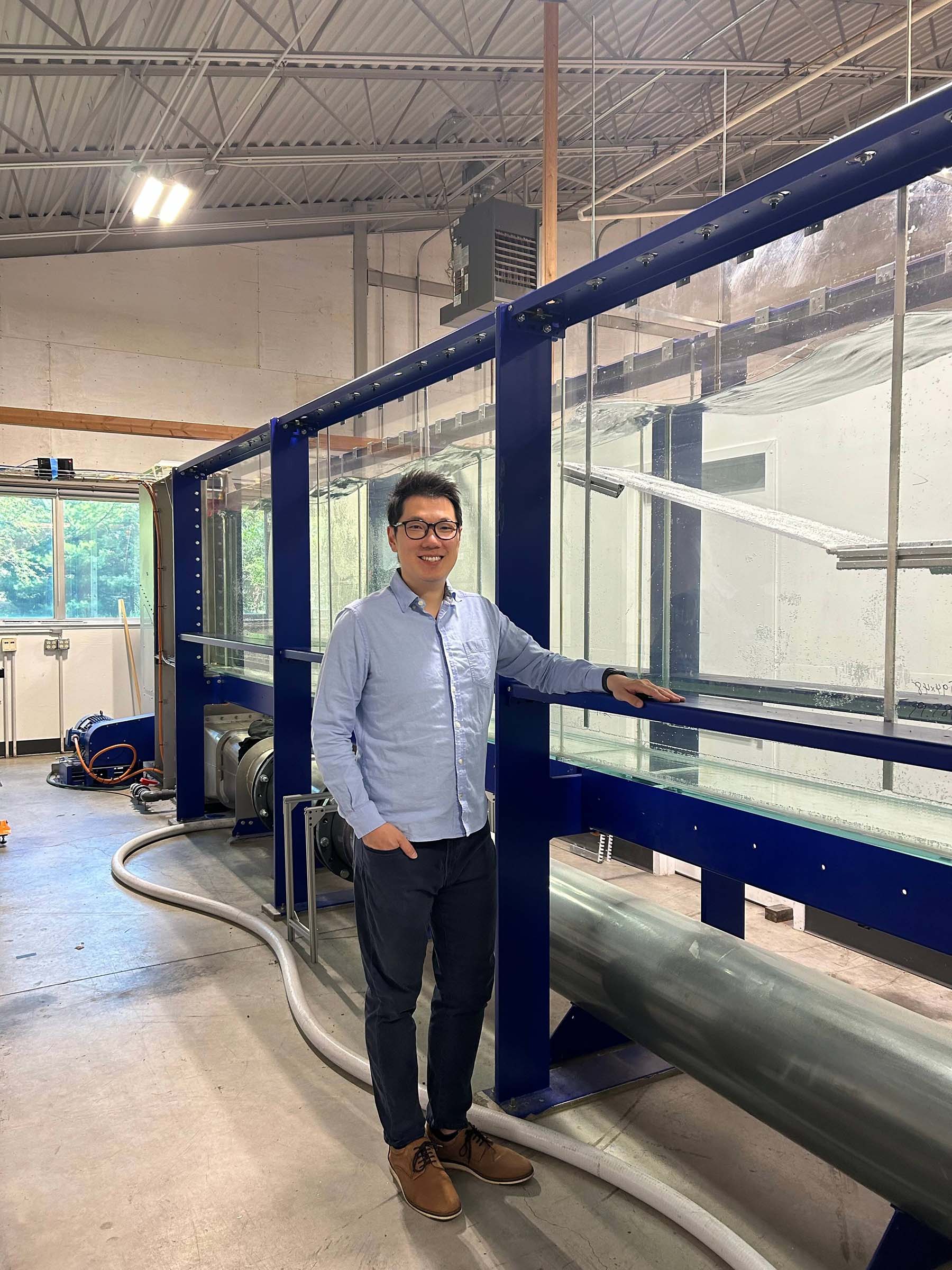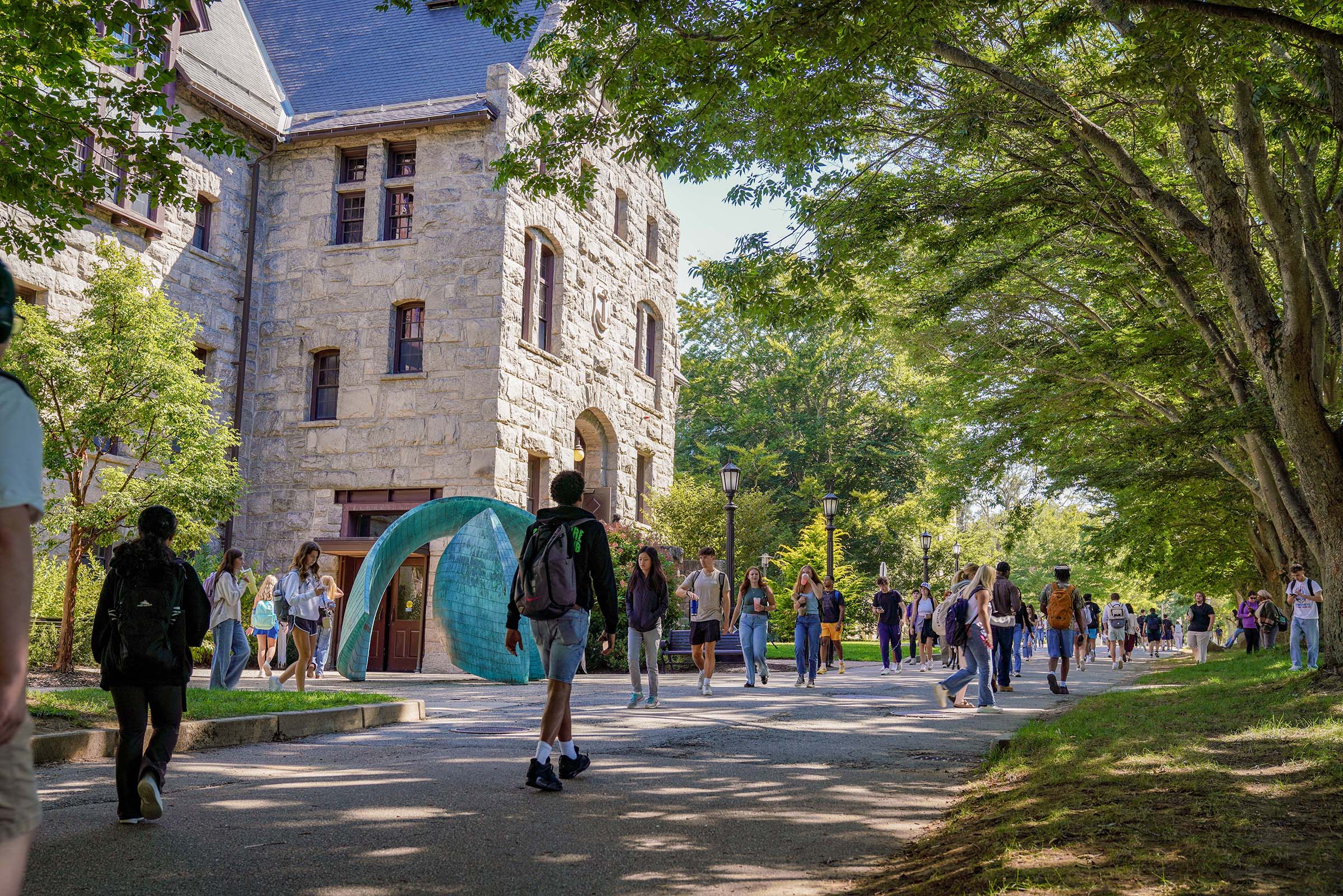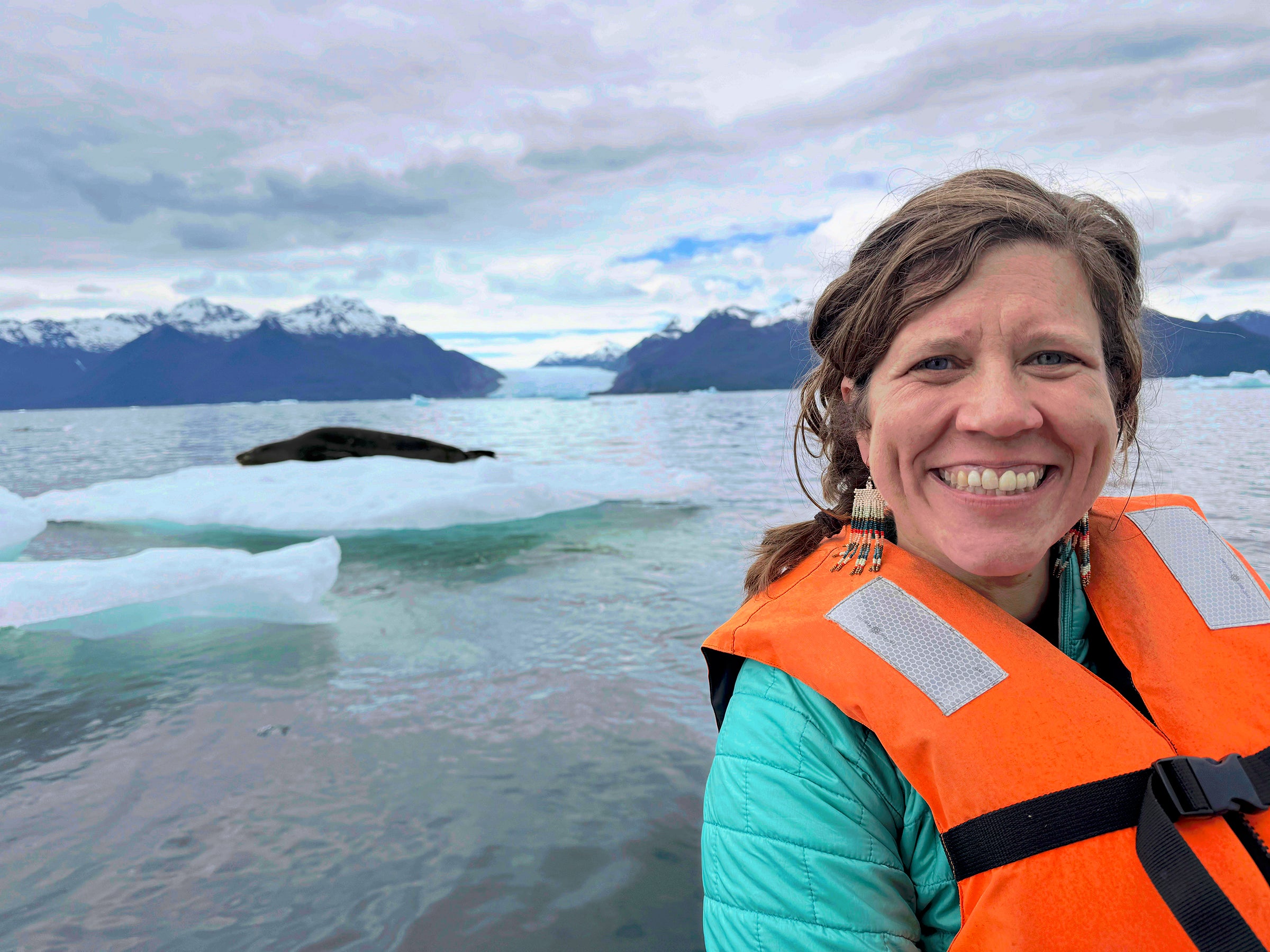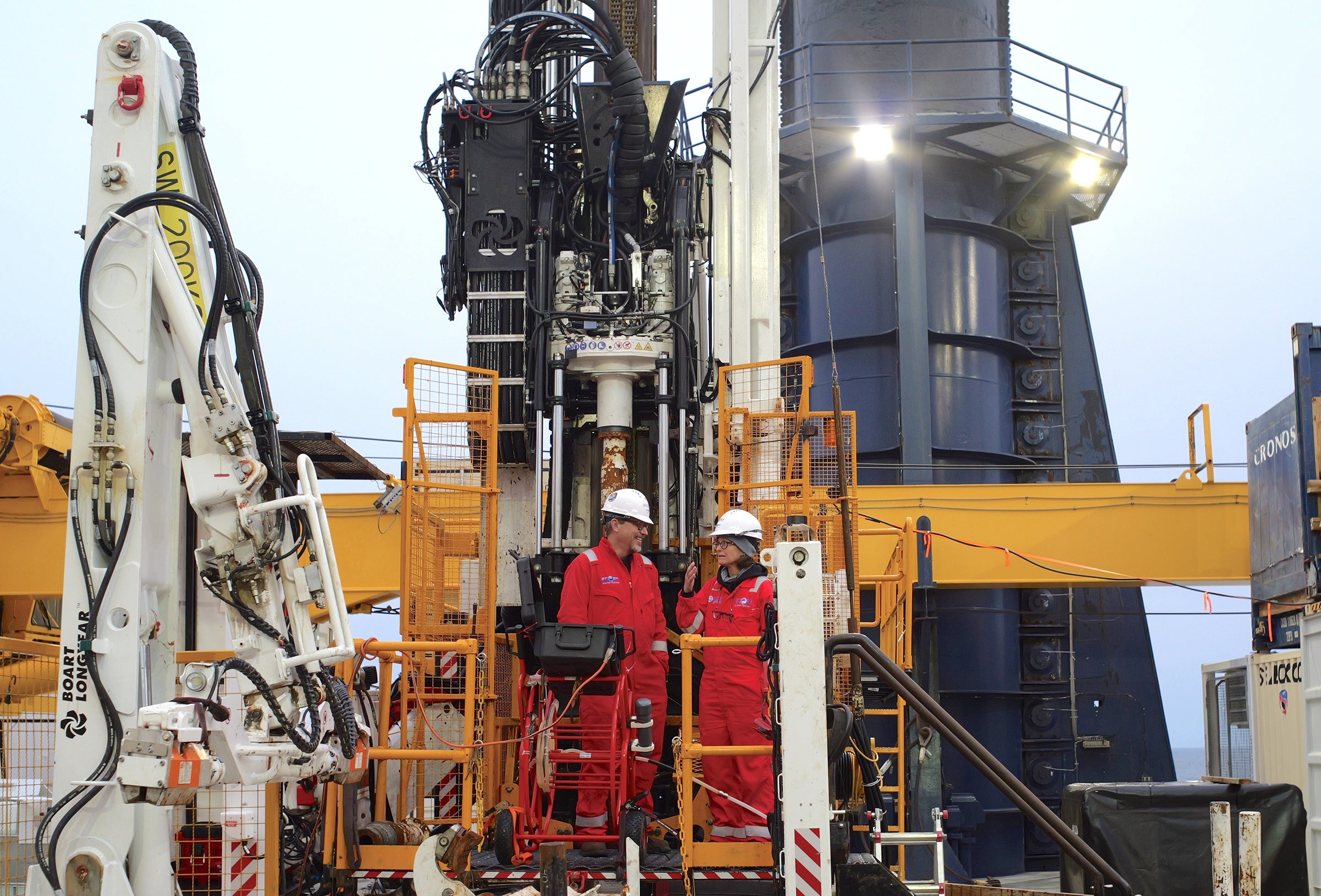URI engineering professor awarded NSF grant to study nature-based answers to wave, current hazards
KINGSTON, R.I. – Aug. 19, 2025 – Rhode Island’s coastline is eroding by nearly two feet annually, with some areas more than double that, according to the Coastal Resources Management Council. Rhode Island’s shoreline loss is especially profound in high-energy wave areas along the state’s more-exposed southern coast. University of Rhode Island Assistant Professor Che-Wei Chang was recently awarded a National Science Foundation grant for his project titled Experimental Investigation of Vegetation Effects on Coastal Wave and Current Dynamics.
“Our research addresses the growing need for effective and sustainable shoreline protection strategies,” said Chang, a professor in the ocean engineering department. “By understanding how coastal vegetation interacts with waves and currents, we can better evaluate its role in protecting coastal communities.”
Chang specializes in studying nature-based solutions to mitigate coastal hazards and enhance resilience in the face of extreme weather and rising sea levels. He is also a senior fellow at the URI Coastal Institute, which supports the growth of multi- and interdisciplinary coastal ecosystem research, discourse, and policy engagement at URI.

The project will use innovative 3D-printed models that replicate the intricate root structures of mangroves to fill key knowledge gaps in how they affect wave and current dynamics. The research will yield critical insights into the role of mangroves and other natural barriers, such as seagrass, salt marshes, and other nature-inspired designs in shoreline protection. “By studying these physical processes and measuring their effects in the lab, we hope to bridge fundamental science and practical application, and improve the accuracy of models that predict vegetation effects on coastal protection,” said Chang.
“As Rhode Island’s flagship state university, URI plays a leading role in promoting the blue economy in the Ocean State, with coastal resilience and nature-based solutions as key components of its strategic vision for the next decade,” said Jason Dahl, chair of the ocean engineering department.
Rising sea levels, intense storm surges and the ensuing coastal vulnerability threaten human lives, infrastructure, and ecosystems. Costly traditional engineering solutions, such as seawalls and breakwaters, have long been used to protect coastlines, but often disrupt natural processes and have limited ecological benefits. Sustainable nature-based approaches could effectively help protect shorelines and be adaptive, more affordable, and environmentally friendly solutions to the increasing risks coastal communities face.
“It is critical to discover how natural infrastructure can be used as sustainable solutions so that we can work with nature and not against it,” said Chang. “We want to see how we can protect the land without harming ecological processes.”
Preliminary testing of 3D mangrove models in Chang’s earlier work has shown their effectiveness in reducing wave energy. The complex root structures generate drag forces and increase turbulence that reduce wave heights as they travel through the flume. Building on this, the team will continue experiments in URI’s wave-current flume to study further how effectively vegetation slows the velocity of waves and currents. This work is an important step toward understanding how natural features reduce wave and surge impacts. It’s also expected to inform future research on how vegetation affects sediment transport and coastal erosion.
Over the two-year project, Chang and his research team will work with undergraduate students from diverse backgrounds through partnerships with established programs at URI. These students will gain hands-on experience in experimental methods, data analysis, and scientific problem-solving applied to real-world environmental challenges.
This project will also engage K-8 educators through URI’s Guiding Education in Math and Science Network program, fostering STEM education in younger students.
By investigating the use of mangroves and other coastal vegetation as natural barriers against waves and currents, this research promotes nature-based solutions for coastal protection, something not only coastal states like Rhode Island is in critical need of, but coastal land masses worldwide.
This press release was written by Krysta Murray, a writer with the URI College of Engineering.
Latest All News
- URI offering new programs for the 2025-26 yearKINGSTON, R.I. – Aug. 19, 2025 – Fall semester classes begin at the University of Rhode Island on Sept. 3, and this academic year the state’s flagship public research university is offering several new programs. Among new undergraduate options, the University will offer a B.A. in Business Studies, an online RN to BSN degree, and […]
- URI professor receives NSF CAREER Award for study of Southern Ocean predatorKINGSTON, R.I. – Aug. 18, 2025 – Trait differences between males and females are widespread across the animal kingdom. Because these traits often lead to trade-offs that affect their reproductive success and survival, understanding them is a fundamental question in biology. The leopard seal, a large predator in the Southern Ocean, offers an extreme example […]
- URI political science professor explores growth of digital repression around the globeKINGSTON, R.I. – Aug. 18, 2025 – One of Skip Mark’s “favorite” examples among the growing list of policies on the use of technology that could be used to suppress people’s rights is robot dogs. In November 2022, the Board of Supervisors in San Francisco voted in support of allowing police to deploy robot dogs […]
- Jensen Named Head Coach of RamettesKINGSTON, R.I. - Rhode Island alumna and former New England Patriots cheerleader Kayla Jensen has been named as the new URI Ramettes head coach.
- How did freshened water end up beneath the seafloor? Sediment collected by scientists may reveal answersKINGSTON, R.I. – Aug. 18, 2025 – How did freshened water end up beneath the New England Shelf miles offshore, how long has it been there, and how much of it exists? Rebecca Robinson, a professor in the University of Rhode Island Graduate School of Oceanography, is attempting to answer those questions by studying samples […]
- Tariff-induced uncertainties cloud R.I. economy’s recession status, says URI economistAug. 15, 2025 WHAT: Rhode Island’s economic performance for June continued the year’s trend of the Current Conditions Index slipping into or remaining in contraction territory. June’s CCI value matched May’s outcome of 42 as the index remained below year-earlier values each month this year. While some indicators improved in June, those improvements were tepid […]












